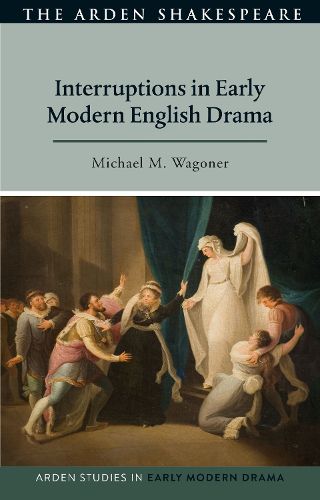Readings Newsletter
Become a Readings Member to make your shopping experience even easier.
Sign in or sign up for free!
You’re not far away from qualifying for FREE standard shipping within Australia
You’ve qualified for FREE standard shipping within Australia
The cart is loading…






To interrupt, both on stage and off, is to wrest power. From the Ghost's appearance in Hamlet to Celia's frightful speech in Volpone, interruptions are an overlooked linguistic and dramatic form that delineates the balance of power within a scene. This book analyses interruptions as a specific form in dramatic literature, arguing that these everyday occurrences, when transformed into aesthetic phenomena, reveal illuminating connections: between characters, between actor and audience, and between text and reader.
Focusing on the works of William Shakespeare, Ben Jonson and John Fletcher, Michael M. Wagoner examines interruptions that occur through the use of punctuation and stage directions, as well as through larger forms, such as conventions and dramaturgy. He demonstrates how studying interruptions may indicate aspects of authorial style - emphasizing a playwright's use and control of a text - and how exploring relative power dynamics pushes readers and audiences to reconsider key plays and characters, providing new considerations of the relationships between Othello and Iago, or Macbeth and the Ghost of Banquo.
$9.00 standard shipping within Australia
FREE standard shipping within Australia for orders over $100.00
Express & International shipping calculated at checkout
To interrupt, both on stage and off, is to wrest power. From the Ghost's appearance in Hamlet to Celia's frightful speech in Volpone, interruptions are an overlooked linguistic and dramatic form that delineates the balance of power within a scene. This book analyses interruptions as a specific form in dramatic literature, arguing that these everyday occurrences, when transformed into aesthetic phenomena, reveal illuminating connections: between characters, between actor and audience, and between text and reader.
Focusing on the works of William Shakespeare, Ben Jonson and John Fletcher, Michael M. Wagoner examines interruptions that occur through the use of punctuation and stage directions, as well as through larger forms, such as conventions and dramaturgy. He demonstrates how studying interruptions may indicate aspects of authorial style - emphasizing a playwright's use and control of a text - and how exploring relative power dynamics pushes readers and audiences to reconsider key plays and characters, providing new considerations of the relationships between Othello and Iago, or Macbeth and the Ghost of Banquo.